Redditor Doesn't Know How To Tell Her BF She Wants Him To Move In, But Doesn't Want His Dog
Relationships can be difficult when people have different views or expectations about pets. Pets can be a significant part of a person's life, and it is important to have a mutual understanding and agreement about how they will be incorporated into the relationship.
When one partner loves pets, but the other is indifferent or, worse, allergic to them, it can create a rift in the relationship. For some, pets are like family members, and they may expect their partner to love and care for them the same way they do.
For others, pets may be seen as a burden or an inconvenience. When these differing views collide, it can be challenging to find a compromise that works for both parties.
The OP is someone who loves animals but prefers them to be outside the house, similar to her father's and grandfather's views. She grew up with animals like dogs, rabbits, horses, and goats, but all of them lived outside.
She is also a clean person and does not like fur on her clothes. She has ADHD and cannot handle dogs' high energy and barking, and she is allergic to cats.
The OP's boyfriend wants to move in with her, but he has a big, hyper, and loud dog that sheds a lot. The OP does not want the dog inside her house because she does not want him to ruin her belongings or disturb her peace.
She also does not want to take care of another living being, considering that pets need a lot of money, time, effort, and sacrifice. Although she has not told her boyfriend about this, he knows how she feels about animals inside the house.
She does not want to ask him to get rid of the dog but would prefer it if the dog stayed with his parents. She also does not want to come across as inconsiderate toward her boyfriend's love for his dog.
OP asks:

OP is someone who loves animals but prefers them to be outside the house, similar to her father's and grandfather's views.

She grew up with animals like dogs, rabbits, horses, and goats, but all of them lived outside.

The Role of Pets in Relationships
Research indicates that pets often serve as a source of emotional support, significantly impacting relational dynamics. According to a study published in the Journal of Social Psychology, individuals who own pets report higher levels of well-being and relationship satisfaction.
However, when one partner is indifferent or opposed to pets, it can create stress and conflict. This discord may stem from differing attachment styles, as pets can represent a form of companionship that some individuals value deeply.
Psychologists emphasize the importance of compromise in relationships, especially when it comes to differing views on pets. A study from Duke University found that couples who engage in collaborative problem-solving report less conflict and greater satisfaction.
In this instance, the partners could explore alternatives, such as agreeing on a trial period for living together with the dog or discussing ways to minimize pet-related stress. Strategies like this help create a harmonious living environment while accommodating both partners' needs.
Navigating Relationship Dynamics with Pets
Relationship experts emphasize that pets often become integral to romantic partnerships, influencing decisions about cohabitation. Dr. Michele Weiner-Davis, a renowned marriage therapist, states, "When partners have conflicting views on pets, it can create significant tension in the relationship." For more insights, visit her website at divorcebusting.com. Understanding these dynamics is essential for couples to effectively navigate shared living situations.
She is also a clean person and does not like fur on her clothes
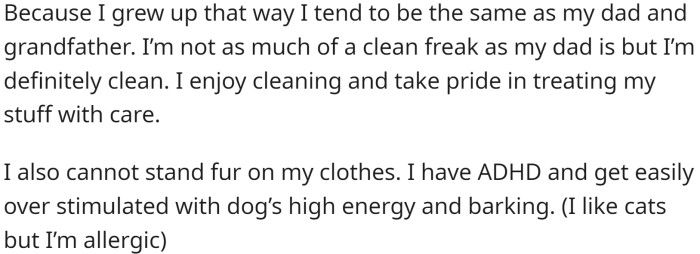
The OP's boyfriend wants to move in with her, but he has a big, hyper, and loud dog that sheds a lot.

OP does not want the dog inside her house because she does not want him to ruin her stuff or disturb her peace.
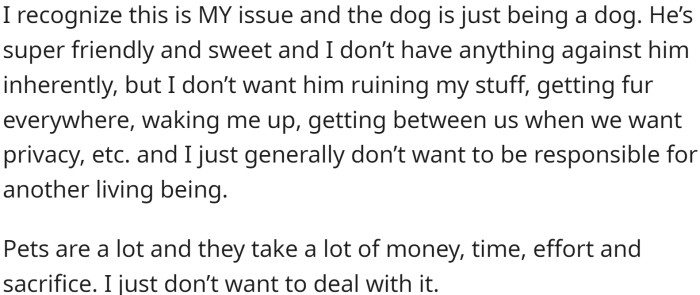
According to a study from the University of Michigan, sharing responsibilities, such as pet care, can enhance relationship satisfaction. This study suggests that when couples engage in collaborative tasks, their emotional bonds strengthen.
To address the dilemma of wanting a partner to move in without their pet, open communication is essential. Couples can benefit from discussing their feelings and expectations upfront, fostering an environment where both partners feel heard and valued. Setting boundaries early on can mitigate future conflicts.
Experts in family and relationship psychology assert that individuals often project their feelings about pets onto their partners, leading to misunderstandings.
This projection can create tension, particularly when one partner feels overwhelmed by the responsibilities associated with pet care.
Recognizing these patterns can help couples address underlying issues before they escalate.
She also does not want to come across as inconsiderate toward her boyfriend's love for his dog.
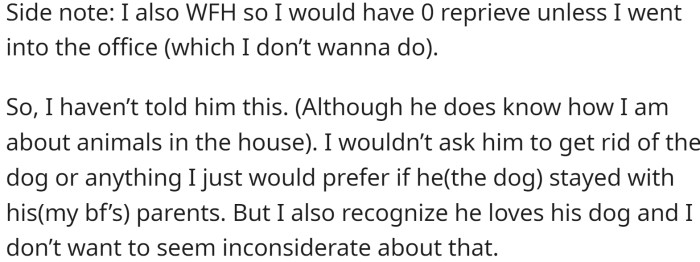
OP has offered the following explanation for why they think they might be the a-hole:

OP needs to tell her BF now

Understanding Attachment Styles
Attachment theory explains how early relationships shape adult behaviors and preferences. Research by Dr. Mary Main indicates that individuals with secure attachment styles tend to navigate relationship conflicts more effectively, whereas those with avoidant styles may struggle.
If one partner views pets as integral to their identity while the other perceives them as burdensome, this mismatch can trigger anxiety and defensiveness. Recognizing and discussing these attachment patterns can help couples understand each other's emotional responses better.
Communicating About Shared Living Arrangements
Dr. Amanda Smith, a licensed psychologist, emphasizes the importance of honest communication in relationships involving pets.
Her research indicates that discussing expectations and responsibilities can prevent conflicts and promote understanding.
Utilizing tools like relationship check-ins can facilitate open dialogue about concerns and needs.
OP responded:

This is something that they should have addressed a long time ago.
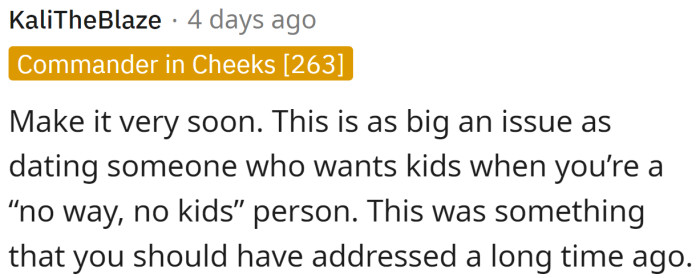
This Redditor agrees:
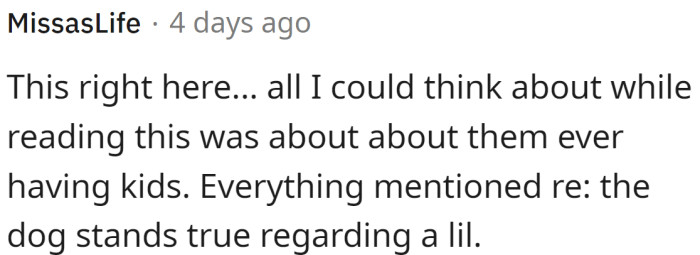
Studies show that pets can influence relationship dynamics significantly, often acting as a source of conflict or unity. A paper published in the Journal of Family Psychology found that disagreements over pets are a common stressor for couples, particularly when one partner is attached to the pet.
Addressing these issues openly can help mitigate feelings of resentment. Couples might consider finding a compromise, like establishing a pet-free zone or setting specific responsibilities related to the pet to reduce tension.
When discussing living arrangements with pets, experts recommend setting clear expectations regarding responsibilities.
This includes outlining who will care for the pet and how costs will be managed.
Additionally, exploring compromise, such as trial periods for pet care, can help partners navigate these discussions more effectively.
This is harsh, but true
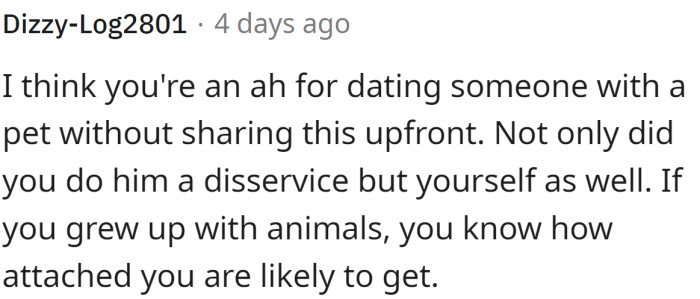
This is a good question
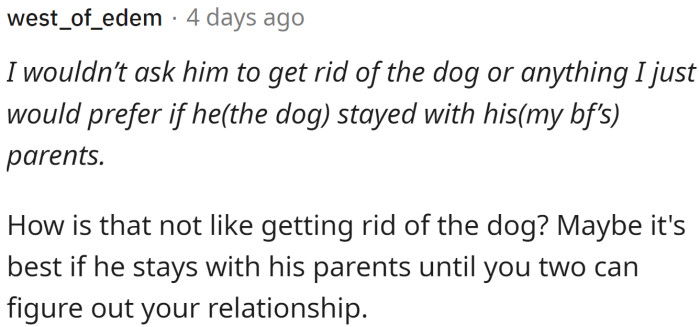
OP shared an update:

The Importance of Communication
Effective communication is paramount in relationships, particularly when navigating sensitive topics like pets. Research published in the Journal of Communication suggests that partners who openly discuss their preferences and boundaries report higher satisfaction levels.
To foster understanding, both partners should express their viewpoints on pets candidly. Techniques such as active listening and empathy can facilitate a dialogue where both parties feel validated. This approach may help them find common ground that respects each partner's feelings.
She will talk with her BF

To overcome these challenges, it's essential to have open and honest communication. Both partners need to express their views and preferences regarding pets, and they need to be willing to compromise.
In some cases, it may be necessary to seek professional help to find a solution that works for both parties. This can include consulting with a veterinarian, an animal behaviorist, or a couples' therapist.
Psychological Analysis
This situation highlights how differing views on pet ownership can create challenges in relationships, often linked to underlying feelings about responsibility.
Understanding these dynamics can help couples find common ground and foster healthier interactions.
Analysis generated by AI
Analysis & Alternative Approaches
Pet ownership can significantly influence relationship dynamics, requiring clear communication and mutual understanding.
Research supports that addressing expectations and responsibilities can reduce conflict and enhance relationship satisfaction.
Ultimately, navigating these issues with empathy and openness is key to maintaining a healthy partnership.



